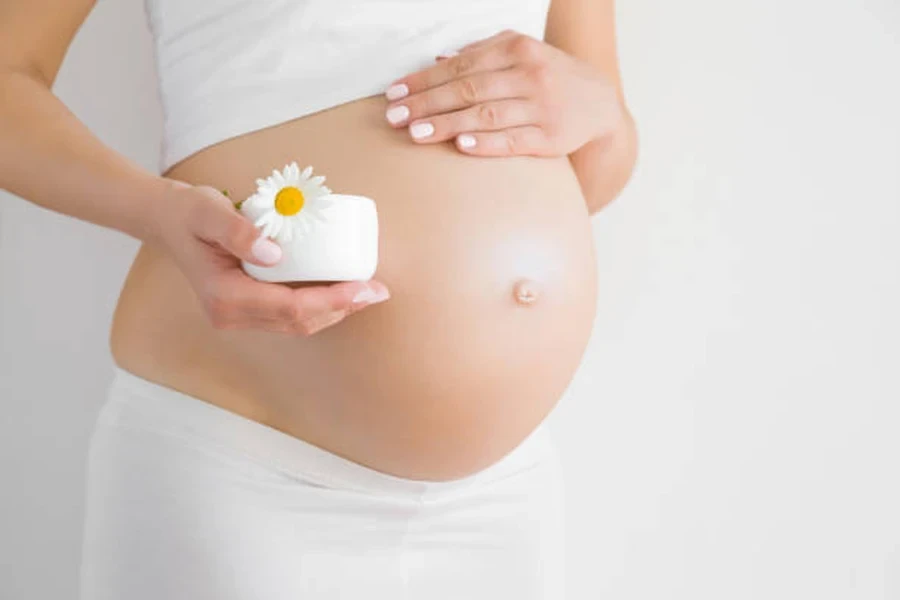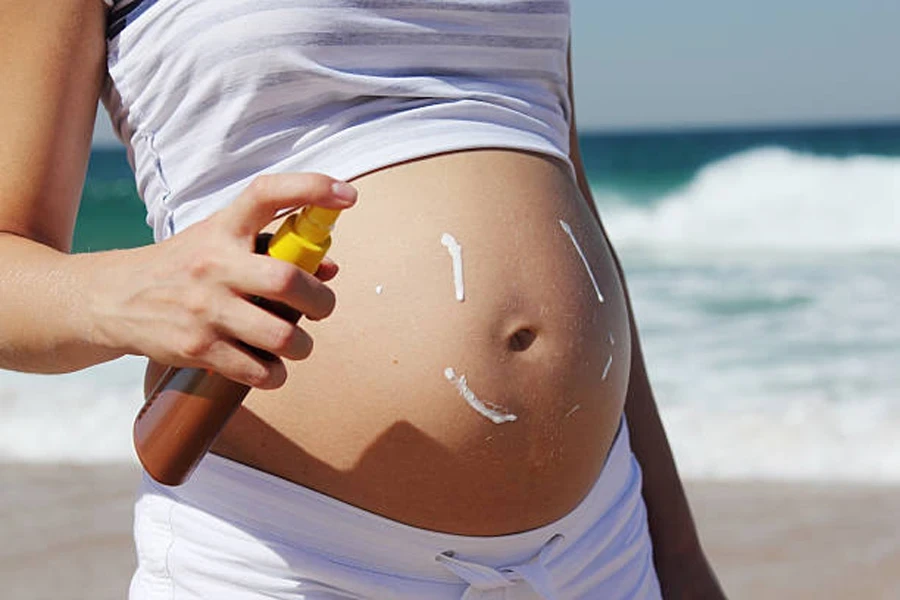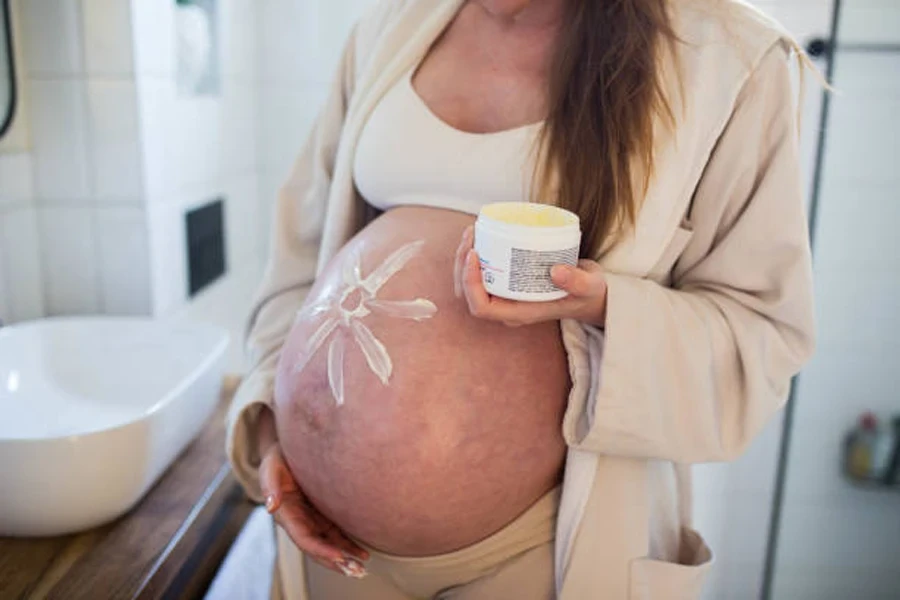Table of Contents
● Introduction
● Essential types of pregnancy skincare and their benefits
● Insights into the 2025 pregnancy skincare market
● Key factors to consider when selecting pregnancy skincare
● Best pregnancy skincare products of 2025
● Conclusion
Introduction
Pregnancy skincare include products which are specifically designed to deal with unique skin concerns during pregnancy. These concerns may includes sensitivity, dryness, pigmentation, and stretch marks. The need for efficient solutions is increasing with the rising demand. These products are expected to provide focused care by 2025 through carefully selected ingredients that aim to reduce risks for both the mother and her baby. During pregnancy, these products offer hydration and sun protection to help mothers maintain healthy and radiant skin while ensuring safety and comfort.
Essential types of pregnancy skincare and their benefits
Gentle cleansers and deep hydration

During pregnancy, increased skin sensitivity makes gentle cleansers essential. These specially formulated products cleanse without irritation or stripping natural oils, often using mild surfactants and soothing agents like glycerin and aloe vera to maintain the skin’s moisture barrier. This is vital because hormonal shifts during pregnancy can sometimes result in skin dryness.
Keeping your skin hydrated all day is important, with hydrating moisturizers that contain hyaluronic acid and ceramides to lock in moisture and maintain a supple look.
Stretch mark saviors
During pregnancy, stretch marks are a worry that women often focus on preventing or reducing. They come due to the stretching of the skin that causes tears in the deeper layer of the skin, mostly found around the belly area, hips, and thighs, which are common areas affected by this condition. Products designed to reduce stretch marks typically include oils creams and lotions that improve the flexibility of the skin.
Quality products frequently feature oils such as almond and jojoba, in addition to the butter and vitamin E that hydrate and nourish the skin deeply. This contributes to enhancing flexibility and decreasing skin tearing. Consistent use is crucial starting from the early stages of pregnancy to gradually lessen the appearance of stretch marks, although outcomes may differ.
Sunscreen for extra protection
It’s crucial to protect your skin from the sun when you’re pregnant because your skin becomes more sensitive, and there’s a chance of developing conditions like melasma or the “mask of pregnancy.” This happens because hormonal changes increase production of melaine and cause dark patches on the skin’s surface. Mineral-based sunscreens are suggested as they offer broad protection and are safe for the mother and the baby.
Mineral sunscreens are different from chemical sunscreens, which aren’t absorbed into the skin. They instead, use zinc oxide and titanium dioxide to block UV light rays, effectively minimizing irritation and allergic reactions—making them a great choice for sensitive skin types. It’s essential to apply sunscreen daily to prevent pigmentation and ensure an even skin tone, especially during pregnancy.
Brightening serums to combat pigmentation
Hormonal fluctuations during pregnancy can cause dark spots and uneven skin tone, known as hyperpigmentation, due to increased melanin production. Brightening serums are crucial, but traditional agents like hydroquinone are unsafe. Instead, safer alternatives such as vitamin C, niacinamide, and bakuchiol are recommended.
Vitamin C reduces dark spots by inhibiting melanin, while niacinamide evens skin tone and improves texture. Bakuchiol, a plant-based retinol alternative, offers anti-aging and brightening benefits without associated risks. These ingredients provide lightweight hydration and effectively target pigmentation, promoting a radiant complexion during pregnancy.
During pregnancy, hormonal changes can lead to black spots and uneven skin tone due to increased malanin production, known as hyperpigmentation. Brightening serums are key in addressing this issue; however, hydroquinone is unsafe according to more traditional approaches. Safer alternatives, like vitamin C, niacinamide, and bakuchiol, are suggested instead.
Vitamin C is used to block melanin production and niacinamide to even out skin tone and enhance texture. Bakuchiol offers antiaging and brightening perks as an alternative to retinol with minimal risks involved in pregnancy for a glowing complexion while maintaining moisture balance, effectively targeting pigmentation issues.
Insights into the 2025 pregnancy skincare market
Natural and organic products gaining popularity

The popularity of organic skincare products for women has seen a notable increase due to the growing awareness of harmful substances in traditional items. With a current value of about USD 1.4 billion, the market for pregnancy skincare is forecasted to reach USD 2.5 billion by 2030, showing a growth rate of 8.2% annually from 2023 to 2030. There is a rising preference for products containing plant-based elements such as aloe vera and chamomile because they provide gentle care and cater to the skin needs of expectant mothers. The increasing global interest in environmentally friendly skincare products has led brands to focus on transparency and creating chemical-free formulas that meet the changing expectations of consumers.
Key factors to consider when selecting pregnancy skincare

Prioritizing safe and gentle ingredients
When choosing skincare products for pregnancy care, you must focus primarily on safety first because some ingredients typically found in skincare options might pose risks during pregnancy. Retinoids like retinol are well known for their antiaging qualities but it’s best to steer them due to the potential harm they might pose to the development of the unborn fetus. Likewise, salicylic acid, commonly found in acne treatments, and hydroquinone, a potent agent for brightening skin, are not advisable.
Some safer options, like hyaluronic acid and niacinamide, provide better outcomes without the potential risks involved. Hyaluronic acid works well for moisturization, while niacinamide calms inflammation and enhances skin quality. Azelaic acid is an exfoliator safe for acne and hyperpigmentation treatment, thus making it a great addition to skincare during pregnancy routines.
Boosting hydration for lasting skin health
Staying hydrated is essential for caring for your skin during pregnancy since dryness and irritation are coomon issues to deal with at this time of life. Opt for skincare products with hydrating components like niacinamide and ceramides to keep your skin moisturized and maintain its natural protection layer. These elements are vital in warding off pregnancy-related problems such as eczema and extra dryness that may arise as your skin expands and becomes more sensitive.
Niacinamide is famous for its ability to reduce inflammation and control sebum production to prevent breakouts. Ceramides strengthen the skins barrier to retain moisture and glycerin acts as a humectant by attracting water into the skin to maintain its hydration levels. By using moisturizers that contain these ingredients you can achieve lasting hydration and keep your skin soft and strong.
Daily sun protection for sensitive skin

Protecting your skin from the sun daily when you’re pregnant is important because your skin is more sensitive, and you can get melasma, which is also called the “mask of pregnancy.” This condition makes dark patches appear on your skin because hormonal changes increase pigmentation. Mineral sunscreens are suggested for their safety and how well they shield the skin since they contain physical blockers such as zinc oxide and titanium dioxide.
Mineral sunscreens offer protection against sun rays without the concerns linked to chemical sunscreens. Zinc oxide and titanium dioxide create a shield on the skin surface to block UV rays effectively and prevent skin irritation or discolouration. Pregnant women should use mineral sunscreen with an SPF of 30 or higher daily to promote even skin tone and shield against harm in the long run.
Best pregnancy skincare products of 2025
Moisturizers for deep hydration and skin barrier support
In 2025, pregnancy-friendly moisturizers focus more on keeping the skin hydrated and strong. Elements such as hyaluronic acid good for deep moisture absorption, ceramides to protect against environmental factors and glycerin to maintain moisture levels all day.
These gentle yet hydrating products are devoid of scents and parabens to suit sensitive skin and combat dryness and flakiness effectively. Moreover, they are non-comedogenic and ideal for individuals with combination skin types.
Sunscreens for broad-spectrum protection
In the pregnancy skincare market of 2025, sunscreen products mainly focus on protecting by utilizing mineral filters such as zinc oxide and titanium dioxide. These components shield against both UVA and UV rays while reducing irritation for delicate skin. Mineral-based sunscreens create a layer on the skin’s surface, acting as a barrier that reflects rays. This is a crucial feature for expectant individuals dealing with heightened skin sensitivity or melasma concerns.
These sunscreens are made without chemicals or artificial scents to ensure they’re gentle. Their non-comedogenic and lightweight formula allows for application without any residue left behind. They are perfect for individuals with acne-prone skin during pregnancy as they don’t irritate while effectively guarding against pigmentation problems, making them a great alternative to chemical-based choices.
Stretch mark prevention and treatment creams and oils
Many expectant individuals are still worried about avoiding stretch marks, while in 2025, the current top products aim to prevent and reduce the visibility of these marks simultaneously. Stretch mark prevention creams and oils commonly feature components that enhance skin elasticity and moisture, like shea butter, almond oil and vitamin E. These nourishing products work to preserve the skin’s suppleness during expansion, decreasing the chances of stretch marks emerging.

The smooth and lightweight texture of these lotions and oils enables fast absorption to keep the skin moisturized without leaving a greasy sensation. Consistent use of these items aids in the skin’s rejuvenation mechanisms by maintaining flexibility and gradually minimizing the appearance of stretch marks. These formulations are designed to offer hydration while steering clear of irritants to ensure their suitability for pregnant individuals throughout the term.
Serums for brightening and pigmentation control
During pregnancy, hormonal shifts can lead to hyperpigmentation issues in the skin, which is quite common among individuals during this phase of life. Serums designed specifically for this concern in 2025 often contain vitamin C, niacinamide, and azelaic acid. Vitamin C serves as an antioxidant that aids in diminishing spots by slowing down melanin production; on the other hand, niacinamide works to balance skin tone and enhance its texture.
These light serums work well when applied under moisturizers without feeling too thick. Azelaic acid acts as an exfoliant that targets pigmentation and acne concerns while still being safe and for use during pregnancy. Created to provide skin-brightening effects without chemicals, these items aid in keeping a uniform complexion during pregnancy.
Conclusion
Choosing skincare products for pregnancy in 2025 involves prioritizing items that are safe and efficient while catering to the changing requirements of the skin during this crucial period. The focus is increasingly shifting towards using components that provide hydration and protection from the sun; these offerings address issues such as sensitivity to products and environmental aggressors. Opting for formulas containing ingredients with a proven track record of safety and effectiveness ensures that one can sustain skin throughout pregnancy without compromising the well-being of both mother and child.



